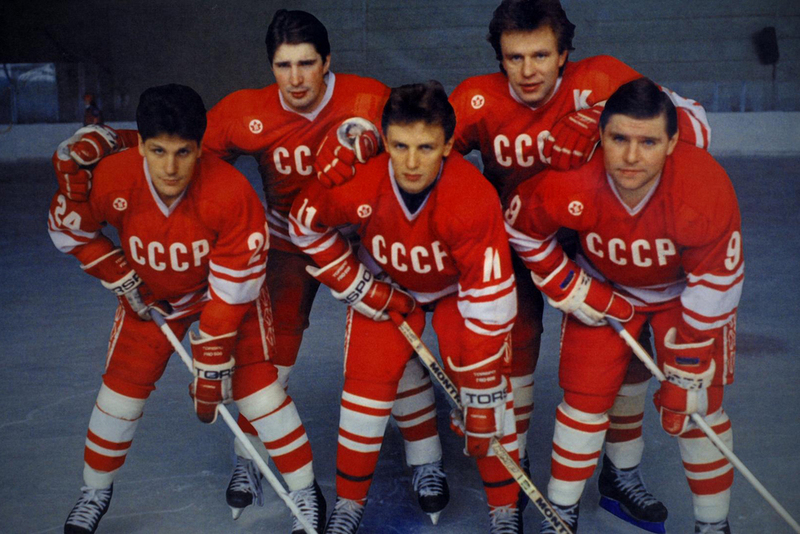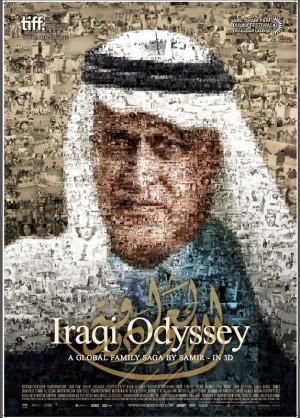
Hockey, Pasolini and Another Serial Killer at Toronto International Film Festival
With 300 films, some 150 of them world premieres, the Toronto International Film Festival resists being reduced to a few themes. One inconvenient truth that haunts this and other festivals won’t go away. As the movie audience shrinks, especially among the young who used to sustain the film business, hundreds (maybe thousands) of films are still trying into connect with it. At a festival like TIFF, those films and their entourages will try to convince you that cinema is the medium that best tells their story. Hope against hope as films go the way of newspapers?
Here’s the take on TIFF 2014 of Liam Lacey of the Toronto Globe and Mail. That said, one theme, if that word isn’t being use too broadly, is history, in at least as many varieties as cinema has genres. Red Army, a hockey saga doc and Cannes hit by Gabe Polsky in which the former Soviet hockey star Viacheslav “Slava” Fetisov takes you through his career – kids’ hockey, special camps, Olympics, NHL, and the new Russia. Army is the key word here.
Players like Fetisov will tell you that they triumphed in spite of their commanding officer, the despotic Soviet coach Viktor Tikhonov, and that the national team there became the extraordinary force that it was in the 1970s and 1980s because of its commitment to teamwork — a far cry from the privileged mercenary zillionaires of pro sports these days. Few North American hockey fans would deny this – Fetisov and his teammates won a Stanley Cup for the Detroit Red Wings — even though the Soviets brought a finesse to the game that meant less of the violence that US fans love on the ice. The film ends with a lament from Fetisov that the country for which they gave everything has changed into a place where money rules.
The film is an ode to comradery and excellence. It may still be a tough sell for Canadian fans, although I’m sure that its distributor, Sony Pictures Classics, is counting on hockey fans throughout North America to come and see it – with a penalty box in each theater for anyone who starts a fight. As Russia prepares to swallow up part of Ukraine, you’ll be hoping that a remnant of the humanity of this film finds its way to the Kremlin’s fan in chief.

The Red Army
Also looking at Russia today is Leviathan, a critics’ favorite at Cannes, in which Andrey Zvyagintsev (The Return)sets his drama in a remote town on the Barents Sea where a local despot, a provincial Ivan the Terrible, has his eyes on a plot of land owned by a private citizen. A mayor like this can’t help but conjure up Toronto’s buffo version, His Honor Rob Ford. A parable about Russia today, Leviathan echoes the fear raised by a number of Russian films these days, that ordinary citizens are losing the very land that they stand on. Take that grim warning, and add the visual elegance of Andrey Tarkovsky.
The history of pop culture figures is back. In Love and Mercy, the directorial debut of the producer Bill Pohlad, Beach Boy Brian Wilson’s psychological collapse comes under scrutiny in a drama with Paul Dano, John Cusack and Paul Giamatti. Both Dano and Cusack play Brian. Was Wilson traumatized by a stern father whom he could never please, despite or was the brilliant songwriter exploited once he crashed and burned by a psychologist who was just after his money? Love and Mercy, scripted by Oren Moverman, will have to measure up against the stylish bio-pic at last year’s TIFF about Jimi Hendrix, Jimi: All Is by My Side, with Andre 3000, and the Coen Brothers’ Inside Llewyn Davis. Those are some big waves to contend with.
Reaching higher in the field of entertainment is Mr. Turner by Mike Leigh. A Cannes premiere, Mr. Turner meets up with Joseph Mallord William Turner (Timothy Spall) at a moment in the late 1820s when the painter returns from a trip to Belgium – the land of Rubens and van Eyck – and removes himself to a town by the sea where he takes his very ordinary landlady for a new mistress and finds his muse in the light over the water that turns incandescent on his canvases. The period drama is a huge canvas for Leigh and cinematographer Dick Pope, who make the best argument in this film for describing cinema as painterly. Leigh throws juxtapositions at us – Turner vs. the Royal Academy, abstraction vs. representation, pursuit of genius vs. neglect of family, Timothy Spall’s clenched face vs. the heavens.
There’s been lots of talk about Oscar consideration for films at TIFF (and Telluride and Venice), and in Leigh’s case, there’s some merit to it.
Otherwise, the Oscar race can wait, or be left to competition among film hacks. Back in the field of film on entertainment, which juxtaposes high and low in Pasolini, starring Willem Dafoe and directed by Abel Ferrara, who certainly knows the world after dark. TIFF’s closing night selection is A Little Chaos, directed by Alan Rickman, who stars with Kate Winslet in another period piece, this one about the designer of a garden at Versailles for Louis XIV (Rickman) and her relationship with the Sun King.
In today’s era of grand architectural projects for superwealthy patrons, this pairing could get at something new, since women were hardly ever granted control over major commissions. Beware. Any historical film with English actors playing the French could be an instant comedy. I can’t wait to see the costumes and locations. Let them eat roses. A Little Chaos and the TIFF opener, The Judge, a legal drama by David Dobkin (Wedding Crashers) , with Robert Downey Jr. (who has been before more judges than anyone in Hollywood) and the ageless Robert Duvall, are world premieres.
In recent weeks, there’s been a drama over films slated to be premieres at TIFF getting sneak previews in Telluride, which doesn’t announce its slate until right before that festival opens. That’s understandably a concern for industry buyer who want to see a film in its first public showing (if you can call a small exclusive festival like Telluride public) or for festivals that compete for films in their programs, but the audience won’t know a premiere from a film that played once before in a festival on the other side of the continent. The public also won’t mind seeing a film that made its debut in Cannes in May, like Red Army, Leviathan, and Mr. Turner. At every major festival, certain actors have a presence that’s unexpected. This year’s actor promises to be Reese Witherspoon, who returns after a screen absence in two films directed by Canadian filmmakers – Wild, directed by Jean-Marc Vallee (Dallas Buyers Club), and The Good Lie, directed by Philippe Falardeau.
Don’t expect Legally Blonde III. Wild takes a drug addict on a cleansing solo hike along the Pacific Crest Trail for 1000 miles. You’ve heard of the 12 step program – now try the 12 million step program.

Iraqi Odyssey, A Film by Samir
Witherspoon’s other film, The Good Lie, puts her in Sudan as a relief worker who helps a group of “Lost Boys” orphaned in the endless violence there. If it sounds a bit like a Sudanese Schindler’s List, you can imagine the kind of Oscar expectations that are already attached to it.
Back to film tropes – another at TIFF is the broad thorough cinematic treatment of a story or stories that tend to be compressed into oblivion by the everyday news media (or the stories that are simply ignored). One such story is the ongoing anguish of Iraq, torn apart by fighting as public executions crowd out coverage of families whose lives have never been reconstructed in displacement after displacement. Iraqi Odyssey, A Film by Samir, traces one family’s path, the family of the filmmaker, in 3-D over a half-century – nothing if not the leveraging of an improbable technology for this kind of story.
And then there’s the film that, through sheer coincidence, stands to profit from what looks like extraordinary timing. The case in point is Tales of the Grim Sleeper, by the veteran documentarian and one man band, Nick Broomfield. As more news emerges about the massive sex abuse crisis in Rotherham, England, Broomfield takes us to South Central Los Angeles, and the trial of Lonnie Franklin, Jr., for the murder of dozens of women, mostly prostitutes.
If that rap weren’t enough, residents of the embattled neighborhood struggling with poverty and gang violence say that the police deliberately suppressed information about a serial killer there, endangering the lives of women as bodies piled up, many of them showing signs of brutal torture. Broomfield takes a story that few on the street were willing to talk about, and brings you poignant testimony. It makes you wonder why the police, who knew more about the crimes than anyone else, took so long to act. One answer is the same answer that police were said to have given in Rotherham – they’re just prostitutes. Broomfield is assisted in his inquiry by one of those victims who was lucky to have escaped Franklin, a loquacious crack addict gone sober named Pam. Gritty cinematography that penetrates the neighborhood’s secrets comes from Broomfield’s son, Barney.
Along these lines comes a drama, The Face of an Angel, Michael Winterbottom’s take on the Amanda Knox case. The film is structured as the story of a filmmaker trying to make a film about the story of the young girl on a year abroad in Bologna, who falls in with a wild crowd and ends up killing her British roommate, or so the jury found. (One of her alleged accomplices pleaded guilty.) At 21, Knox, with girl-next-door face and a chilling composure, was a star, albeit one with credibility problems. Now she’s an absentee defendant in Seattle. Winterbottom assigns himself the task of how one makes a film about such a character. The writer/director is known for taking on problems that he doesn’t quite know how to solve when he begins a project. The trip toward the resolution (even in The Trip and The Trip to Italy, which The Face of an Angel could be called if Winterbottom hadn’t already used it for another film) is usually worth the ride. Hundreds more worthy films are playing at TIFF, and later coming to cinemas or some delivery platform near you. I’ll be back with more about them in a later post.
